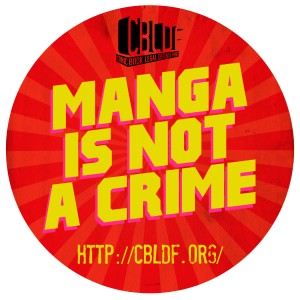 On the Saturday of Comic-Con, CBLDF Executive Director joined Ryan Matheson for “CBLDF: The Fight to Defend Manga,” a panel discussing the particular issues that manga and its fans face when it comes to censorship. Matheson was arrested by Canadian authorities at a border crossing when he entered the country with manga on his laptop that authorities incorrectly labeled child pornography. CBLDF won an important victory in the case when the charges were withdrawn. Carlo Santos with Anime News Network was on hand for the panel and took the time to write it up, summing up the issues manga face:
On the Saturday of Comic-Con, CBLDF Executive Director joined Ryan Matheson for “CBLDF: The Fight to Defend Manga,” a panel discussing the particular issues that manga and its fans face when it comes to censorship. Matheson was arrested by Canadian authorities at a border crossing when he entered the country with manga on his laptop that authorities incorrectly labeled child pornography. CBLDF won an important victory in the case when the charges were withdrawn. Carlo Santos with Anime News Network was on hand for the panel and took the time to write it up, summing up the issues manga face:
Different attitudes to sexuality in Japanese culture have caused concern among American audiences. By now, an entire generation of North America readers have grown up on manga and anime culture , making it a major cultural phenomenon—but also a potential legal issue for those who do not understand it.
After a brief history of the manga-related cases that CBLDF has been involved in, including Texas v. Jesus Castillo and US v. Christopher Handley, Santos describes Matheson’s presentation at the panel:
Matheson himself was present at the panel to tell his story. In his account, he said that his position at the end of a security screening line and his possession of electronics (including the laptop) triggered an intensive search “for some reason.” As he recounted what happened, Matheson said that the authorities never told him what they were doing; after 20 minutes they had said “you shouldn’t have this here” and pointed out a scan from an artbook. The full search continued for 4 hours, long beyond what was legally allowable for the security staff. Any form of anime or manga-related content (even an innocuous wallpaper on his computer) inexplicably set off red lights among the authorities.
Matheson described his experience further, noting how the authorities made no effort to help him despite his requests to see the U.S. Embassy or find out what was going on. His stay in jail left him cold and hungry (he asked for food six times and never got a response); “the one thing I ended up getting was toilet paper,” he said. During his time in protective custody, Matheson was told that he “must have done something really bad,” apparently under a wrong assumption that he had actually molested a minor. “If you get raped in here, it doesn’t count,” was one of the threats he heard from the authorities.
Even after he had been released and was awaiting trial, Matheson was told not to use the internet at all (aside from work usage at one specific company), or even talk to children, and was limited to barely 10 hours a week of work at that one company. Matheson said that he basically could not live his life because of these restrictions.
Santos further describes the material that led to Matheson’s arrest, material that is otherwise constitutionally protected in the United States:
Among the various images that led to Matheson’s arrest was a clearly unrealistic, moe-style parody of the Kama Sutra. But somehow prosecutors had decided that “this is a sexually explicit image of five-year-olds.” Another work that was considered obscene was a doujinshi of Magical Girl Lyrical Nanoha StrikerS where the characters are, in fact, grown up.
You can read the rest of the Anime News Network article here. Jamie Coville with First Comics News posted a recording of the panel, which you can listen to here.
To date, the case has cost $75,000, and CBLDF is still raising money to help cover the remaining $45,000. Please help support CBLDF’s important First Amendment work and help us cover this cost by making a donation or becoming a member of the CBLDF!
Betsy Gomez is the Web Editor for CBLDF.